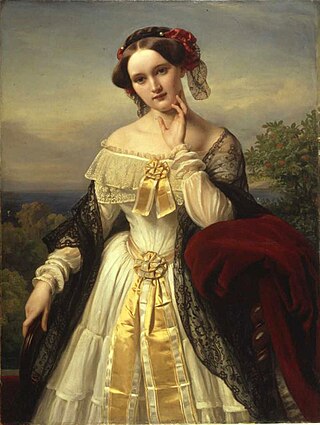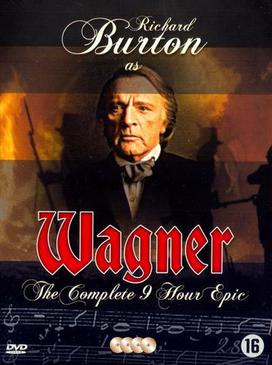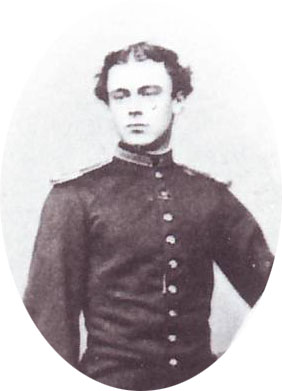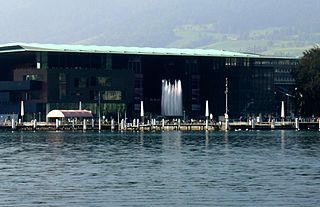
Wilhelm Richard Wagner was a German composer, theatre director, polemicist, and conductor who is chiefly known for his operas. Unlike most opera composers, Wagner wrote both the libretto and the music for each of his stage works. Initially establishing his reputation as a composer of works in the romantic vein of Carl Maria von Weber and Giacomo Meyerbeer, Wagner revolutionised opera through his concept of the Gesamtkunstwerk, by which he sought to synthesise the poetic, visual, musical and dramatic arts, with music subsidiary to drama. He described this vision in a series of essays published between 1849 and 1852. Wagner realised these ideas most fully in the first half of the four-opera cycle Der Ring des Nibelungen.

The Bayreuth Festival is a music festival held annually in Bayreuth, Germany, at which performances of stage works by the 19th-century German composer Richard Wagner are presented. Wagner himself conceived and promoted the idea of a special festival to showcase his own works, in particular his monumental cycle Der Ring des Nibelungen and Parsifal.

The Siegfried Idyll, WWV 103, by Richard Wagner is a symphonic poem for chamber orchestra.

Francesca Gaetana Cosima Wagner was the daughter of the Hungarian composer and pianist Franz Liszt and Franco-German romantic author Marie d'Agoult. She became the second wife of the German composer Richard Wagner, and with him founded the Bayreuth Festival as a showcase for his stage works; after his death she devoted the rest of her life to the promotion of his music and philosophy. Commentators have recognised Cosima as the principal inspiration for Wagner's later works, particularly Parsifal.

Siegfried Helferich Richard Wagner was a German composer and conductor, the son of Richard Wagner. He was an opera composer and the artistic director of the Bayreuth Festival from 1908 to 1930.
The Bayreuth Circle was a name originally applied by some writers to devotees of Richard Wagner's music who attended and supported the annual Bayreuth Festival in the later 19th and early twentieth centuries. As some of these devotees espoused nationalistic German politics, and some of them were supporters of Adolf Hitler from the 1920s onwards, this group of people has been associated by some writers with the rise of Nazism.

Wesendonck Lieder, WWV 91, is the common name of a set of five songs for female voice and piano by Richard Wagner, Fünf Gedichte für eine Frauenstimme. He set five poems by Mathilde Wesendonck while he was working on his opera Tristan und Isolde. The songs, together with the Siegfried Idyll, are the two non-operatic works by Wagner most regularly performed.

Mahler is a 1974 British biographical film based on the life of Austro-Bohemian composer Gustav Mahler. It was written and directed by Ken Russell for Goodtimes Enterprises, and starred Robert Powell as Gustav Mahler and Georgina Hale as Alma Mahler. The film was entered into the 1974 Cannes Film Festival, where it won the Technical Grand Prize.
The composition of the epic operatic tetralogy The Ring of the Nibelung occupied Richard Wagner for more than a quarter of a century. Conceived around 1848, the work was not finished until 1874, less than two years before the entire cycle was given its premiere at Bayreuth. Most of this time was devoted to the composition of the music, the text having been largely completed in about four years.

The German composer Richard Wagner was a controversial figure during his lifetime, and has continued to be so after his death. Even today he is associated in the minds of many with Nazism and his operas are often thought to extol the virtues of German nationalism. The writer and Wagner scholar Bryan Magee has written:
I sometimes think there are two Wagners in our culture, almost unrecognizably different from one another: the Wagner possessed by those who know his work, and the Wagner imagined by those who know him only by name and reputation.

Wahnfried was the name given by Richard Wagner to his villa in Bayreuth. The name is a German compound of Wahn and Fried(e).

Wagner is a 1983 television miniseries on the life of Richard Wagner with Richard Burton in the title role. It was directed by Tony Palmer and written by Charles Wood. The film was later released on DVD as a ten-part miniseries.

Paul Maximilian Lamoral, Prince of Thurn and Taxis, was the third child of Maximilian Karl, 6th Prince of Thurn and Taxis and his second wife Princess Mathilde Sophie of Oettingen-Oettingen and Oettingen-Spielberg. He was buried in Cannes, at the Cimetière du Grand Jas, Allée du Silence no. 33 under the name of Paul de Fels.

Mein Leben is the title given by the composer Richard Wagner to his autobiography, covering the years from his birth in 1813 to 1864.

Lucerne Festival is one of the leading international festivals in the world of classical music and presents a series of classical music festivals based in Lucerne, Switzerland. Founded in 1938 by Ernest Ansermet and Walter Schulthess, it currently produces three festivals per year. Since 1999, Michael Haefliger has been its Executive and Artistic Director.

Eva Maria Chamberlain was the daughter of Richard Wagner and Cosima Wagner, and the wife of Houston Stewart Chamberlain. When she was born, her mother was still married to Hans von Bülow. Through her mother, she was also a granddaughter of Franz Liszt. With her siblings Isolde and Siegfried, Eva was brought up by a house teacher.

Isolde Josefa Ludovika Beidler was the first child of the composer Richard Wagner and his wife, who is generally known as Cosima Wagner.

The Bayreuth premiere cast of Parsifal lists the contributors to the new productions of Richard Wagner's inaugural stage play Parsifal, including the premiere, which took place on 26 July 1882 at the Bayreuth Festival.

The Richard Wagner Museum is a cultural site in Lucerne, Switzerland, situated on the shore of Lake Lucerne in the district of Tribschen. The composer Richard Wagner lived here from 1866 to 1872; in 1933 it was opened as a museum.

Baroness Daniela von Bülow, nicknamed Loulou or Lusch, was a German pianist and costume designer.
















